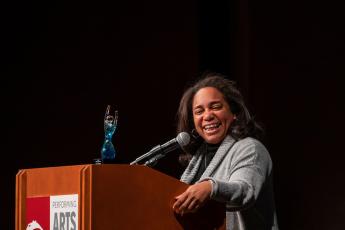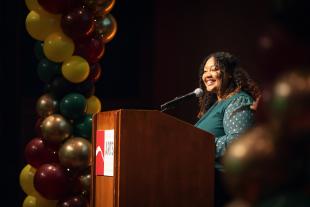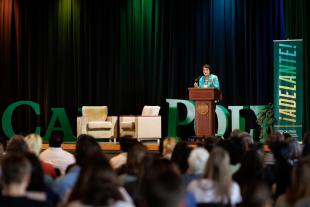'We're Just At the Beginning.' MLK Legacy Award Winner Denise Isom Discusses Diversity and Equity at Cal Poly

The recipient of the 2020 Martin Luther King Legacy Award is a department chair who works with determination and devotion to create a more just, equitable and diverse Cal Poly campus.
Denise Isom, professor and chair of the Ethnic Studies Department, was honored Jan. 15 with the MLK Legacy Award. Cal Poly’s Cross Cultural Centers created the award last year to recognize a campus community member who upholds the legacy of the Rev. Martin Luther King Jr. by leading with love and hope to create a better campus for all.
At a ceremony honoring King’s legacy and presenting the award, Beya Makekau, interim director of the Cross Cultural Centers, spoke about the impact of Isom’s work.
“Those who nominated her described her as someone who works diligently to create a culture of care and radical love,” Makekau said. “She has made Cal Poly feel like a home for underrepresented students, staff and faculty. She is the embodiment of a hope for a better, more diverse future and takes every action to help realize that future.”
Isom, who came to Cal Poly in 2008 and has led the Ethnic Studies Department for almost seven years, has created a space for underrepresented students to be heard and find support and community.
She has served as the interim associate director of Cal Poly’s Office of University Diversity and Inclusion (OUDI); co-created the annual Teach-In event, now in its fourth year; and co-created and co-leads the diversity and equity in teaching summer workshop for faculty. Isom’s recent honors include the College of Liberal Arts 2017 Diversity Award, the 2019 faculty award for Outstanding Contribution to the African American Community “Living the Dream” Award, and the 2019 Award for Excellence in Partnership and Service from the Cal Poly History Department.
Isom spoke with Cal Poly News about some of the diversity and equity work she’s been involved in at Cal Poly, and what comes next.
What might surprise an average Cal Poly alum about the experience that underrepresented students, faculty and staff have here?
Part of the fallacy of the ways in which we discuss race is the idea that racism means extremist events, as opposed to a daily lived experience of racial inequity and otherness and lack of sense of belonging. There is a persistent grind that I think permeates the experience of students of color. For some students at Cal Poly, I think they are quite conscious of that. For others, I think they deal with it by saying, “I'm going to ignore it and plow ahead.” And because our students are bright and driven and come here with a purpose, they're often able to push on and become animal scientists and engineers and architects, never having really engaged the other part of it because that's how they worked to survive it.
What has changed, and hopefully improved about that situation at Cal Poly in the time that you've been here?
We have done an awful lot to make intentional progress. Every college now has identified an associate dean who's tasked with addressing diversity and inclusion within their area. OUDI has been elevated to the president's cabinet level. There are now professionals all over campus who are tasked with engaging diversity and equity in the various elements in life of the institution. Those are huge changes on this campus that I think will continue to expand and have impact on not just our campus’s structure and curriculum, but on the campus climate and culture as well.
Where do you think are some areas where we still have room to grow?
We're just at the beginning, and so we need to do more in the way of targeted, themed, intentional hiring of faculty, not just of color, but faculty who are engaged with issues of diversity and equity in their disciplines across the university so that our curriculum changes. We've seen more and more research about the importance of students of color having a teacher who looks like them, and we need to provide that. We also need to add top-level staff who can look at university-wide issues of curriculum assessment, measuring where we're going and the effectiveness of the things that we're doing. We have a long way to go.
As head of the Ethnic Studies Department, what do you think is the program’s value, whether for students of color, students majoring in ethnic studies, or just students who might happen to take a class or two here?
I think our department has become a kind of hub where students of color can find a home, have a place of belonging. Giving students a place where they feel safe and respected is one of the things I'm most proud of. From a teaching standpoint, much of our curriculum is connected to the general education program, and that is very intentional. We see our content as connected to every discipline on campus, so the engineers and the designers and the biologists that come into our classes have the opportunity to see the world from another lens. The growth we’ve seen in this program speaks to both the quality of our faculty and the desire students have to understand the ever-expanding, ever-changing global world that we live in.




